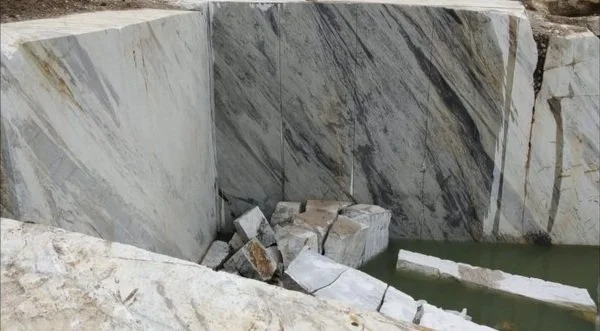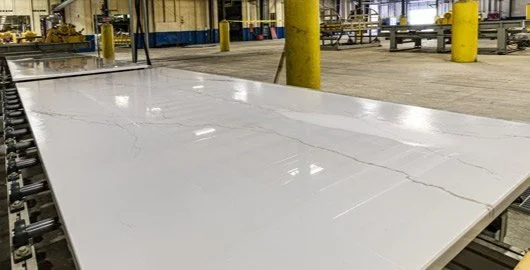
Granite vs. Quartz
Countertops
Which is Right for You?
When it comes to choosing the right countertop material for your kitchen or bathroom in Bluffton, SC, the two most popular options homeowners consider are granite and quartz. Both materials offer distinct benefits, but they also come with certain drawbacks that need to be weighed. This comprehensive guide will compare the pros and cons of granite vs. quartz countertops, helping you make an informed decision that fits your needs, budget, and lifestyle.
Understanding the Basics
Granite is a natural stone that is quarried from the earth and cut into slabs. Every slab of granite is unique, featuring its own colors, patterns, and textures, making it a great choice for those looking to add a natural, one-of-a-kind element to their space.
Quartz, on the other hand, is an engineered stone made from a combination of natural quartz crystals and resins. This process allows for more uniformity in color and design while providing similar durability to natural stone.
Durability: Granite vs. Quartz
Granite Durability
Granite is renowned for its toughness. It is highly resistant to scratches and heat, making it an excellent option for high-traffic kitchen environments. If you tend to cook often or handle heavy cookware, granite's natural heat resistance ensures that hot pots and pans can be placed directly on the surface without causing damage.
However, because granite is a natural stone, it has small pores and can be porous. This makes it susceptible to staining if not properly sealed on a regular basis. Homeowners need to reseal granite countertops at least once a year to maintain their durability and resistance to moisture.
Quartz Durability
Quartz is also an extremely durable material but differs from granite in several key aspects. Quartz is non-porous due to the resins used in its manufacturing process, which means it does not require sealing. This makes quartz highly resistant to stains, scratches, and moisture — making it particularly advantageous for bathroom countertops.
While quartz is also resistant to heat, it is not as heat-resistant as granite. Direct exposure to high temperatures, such as placing a hot pot directly on the surface, can damage quartz countertops over time, leading to warping or discoloration.
Winner: Both are highly durable, but granite edges out for heat resistance, while quartz wins for being non-porous and low-maintenance.
Aesthetic Differences Between Granite and Quartz
Granite Aesthetic
Granite countertops are highly valued for their natural beauty. Since every slab of granite is unique, it offers a rich, natural appearance that adds a luxurious feel to any space. Granite's natural variations in color, veining, and patterns create a one-of-a-kind countertop that is perfect for homeowners looking to add personality and depth to their kitchen or bathroom.
Granite is available in a wide range of colors, including shades of black, white, green, blue, and red. These color variations come directly from the natural stone itself, offering a timeless look that can fit both traditional and contemporary designs.
Quartz Aesthetic
Quartz countertops, on the other hand, are man-made, which allows for a more controlled and consistent appearance. Quartz manufacturers can mimic the look of natural stone like granite or marble while providing a broader range of color options. Since quartz is engineered, it is available in a wider variety of styles and colors that may not be found in natural stone.
If you prefer a consistent pattern or are looking for bold colors like bright white or pure black, quartz is an excellent option. Its uniform appearance can give a modern, streamlined look to kitchens and bathrooms.
Winner: For unique, natural beauty, granite is the winner. For consistent, modern aesthetics, quartz takes the edge.
Environmental Impact: Granite vs. Quartz
Granite
Granite is a natural material that is quarried from the earth, which can have an environmental impact depending on the methods used for extraction. Transportation of granite, especially if it's sourced from overseas, can further contribute to its environmental footprint.
Quartz
While quartz is an engineered product, many manufacturers are moving toward more sustainable practices. Some quartz countertops are made using recycled materials, and because quartz can be sourced locally, it may have a lower carbon footprint than granite imported from abroad.
Winner: Quartz has a slight advantage when considering eco-friendly options, especially if locally sourced.
Common Questions
1. Can granite and quartz be used outdoors?
Granite is a better option for outdoor spaces due to its natural durability and resistance to sunlight. Quartz, on the other hand, may fade when exposed to UV rays for extended periods, so it's better suited for indoor use.
2. Which material is more eco-friendly?
Quartz is often considered more eco-friendly, especially if sourced from local manufacturers. However, certain granite varieties may also be sustainably quarried.
3. Is one material more expensive than the other?
Both granite and quartz can range in price depending on the quality, pattern, and region. However, quartz tends to offer a more predictable price point, while granite can vary greatly.
Final Verdict: Which is Right for You?
When it comes to choosing between granite and quartz countertops for your Bluffton or Hilton Head home, the decision largely depends on your personal preferences and needs. If you're drawn to the natural beauty and heat resistance of a unique granite slab, then granite might be the right choice for you. However, if you're looking for a low-maintenance, non-porous, and consistent countertop, quartz might be a better fit.
For expert advice and professional installation, contact Precision Granite & Marble today to help make your countertop decision easier.






